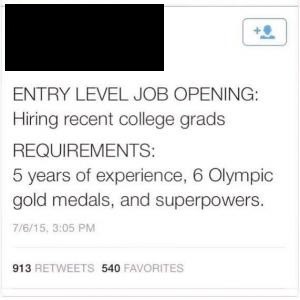 This tweet is an exaggeration, but to anyone applying for a job, this may feel rather accurate. Especially if you are seeking an entry level position. How can you have five years of experience when you just graduated from college? Even if you worked while you completed your degree, chances are you still do not have five years experience. I have just completed my Bachelor of Social Work and have started looking for a job in my field and I have to say, I feel more under pressure now that I am applying for jobs than I did when I was going to school.
This tweet is an exaggeration, but to anyone applying for a job, this may feel rather accurate. Especially if you are seeking an entry level position. How can you have five years of experience when you just graduated from college? Even if you worked while you completed your degree, chances are you still do not have five years experience. I have just completed my Bachelor of Social Work and have started looking for a job in my field and I have to say, I feel more under pressure now that I am applying for jobs than I did when I was going to school.
There are many jobs out there that are exciting to me, but all of them seem to require five year’s experience, which I do not have. I am like many other post-secondary students that graduate. I need to get a full time position. I need to pay back my student loans. I need to get my career started!
I want to share with you 4 of my favorite strategies that I have learned from the New York Times bestselling book, Performing Under Pressure, that help me handle this pressure:
Strategy #1 – Befriend the Moment
It’s easy to view applying for jobs as an intimidating thing. You are being judged on your abilities based on what fits on a piece of paper and if you are anything like me, this may feel unfair. I know I am capable of doing a job but no matter how perfect my resume is, I feel that it does not completely represent who I am.
For example; a resume does not fully demonstrate how I will smile when you ask me how to do a task, even if I am unsure about it. Thinking about a moment as a crisis increases the pressure. Instead, I think about applying for jobs as an opportunity to grow. Even if I do not get the job, every application I complete helps develop my resume and cover letter writing skills. It also helps to me to think about experiences I have had and what I learned from them.
And lastly I am learning more and more about what I want out of a job and what it is I bring to any job. This thinking makes me excited to apply for a job, whether I get it or not, I am becoming a better person. And really the more jobs I apply to the more chance I have of finding one.
Strategy #2 – Recognize that you are Worthy
When applying for jobs, it is unlikely that the very first job you apply for you are going to get. Especially if you are applying for an entrance level job. It is easy to get down on yourself when you do not get hired for a job. This thinking can lead to ‘awfulizing’ the whole situation of applying for jobs. Thinking that you are not good enough, that you are never going to get a job you like and that you will have to settle. I have found this thinking leads to me giving up. I will not apply for a job that sounds really good or not put the effort in to make sure my resume and cover letter are great because I think I will not get the job anyway.
When applying for jobs, it is important that you recognize you are worthy and that you can get the job. There are two things you can do to confirm your self-worth. First write down all your values and why they are important to you. This helps create your identity outside of your skills at work. Next, write down all the skills you possess. I do this before every job application I complete because than I feel confident I am a good candidate for the job and put the effort into making my resume and cover letter great. If I do not get the job, I won’t feel that I have failed. I am not my job.
Strategy #3 – Be a Control Freak
When applying for a job there are many variables that are out of your control. Who applies for the job, the people who will look at your resume and the decision that they make.
There are things that you can control; the way your resume and cover letter look, that you have all certifications that you need, meeting the application deadline, and having your cover letter addressed to the correct person. When I apply for a job, these are the things I focus on, the things that I can control.
Thinking about the things you cannot control just increases the pressure you feel. Take a few moments before the pressure situation and make a list in your head of what you can and cannot control. Then think about doing the things you can control well. Let your mind go to what you cannot control for a minute and how it impacts your life in the big picture. For example; what will happen if you do not get picked for that job. Will this matter in six weeks, six months, six years? Probably not, you will have gotten another job by then.
Now bring your thinking back again to what you can control and envision yourself doing these things well. Now start working on the things you can control.
Strategy #4 – Sharing the Pressure
It is proven that communicating your feelings of distress to others can actually reduce your feelings of stress and anxiety. Do not sit in your office applying for jobs in solitude, letting the stress and pressure overwhelm you. Communicate what you are feeling with those around you, whether it is your family, friends or someone in one of your classes. Talking to people will not just reduce the pressure – allowing you to perform better, it can also provide you with different insights or strategies to try.
Often when we are stressed about a situation, the way we view it is not always realistic, and talking to others who do not feel the stress we do can help us to see the situation more practically. Other people will have ideas on different strategies and solutions then the ones we have tried. That person just might know about the job of your dreams.
Whether you are applying for a job or find yourself in another pressure filled situation, recall these 4 strategies to be your best when it matters most.
3 ways to learn more:
- Read and buy the book, Performing Under Pressure: The Science of Doing Your Best When it Matters Most
- Learn strategies from the Inside Quest interview
- Watch this performing under pressure video

